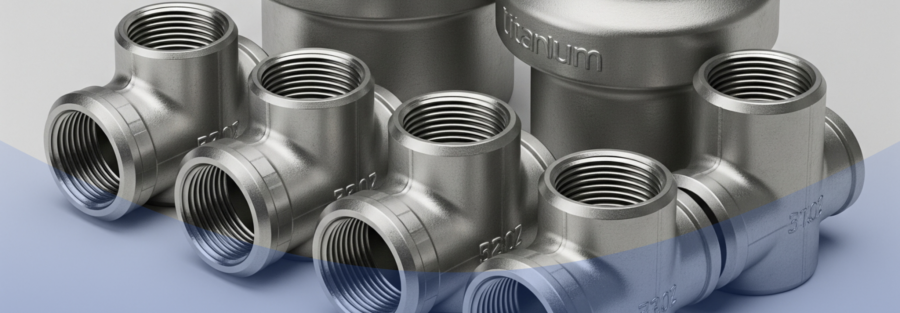Table of Contents
1. Introduction
Titanium pipe fittings are highly valued in industries that require strength, corrosion resistance, and high performance under extreme conditions. Due to titanium’s lightweight properties, resistance to corrosion, and high-temperature tolerance, it is a top choice for critical applications in industries such as aerospace, petrochemical, and marine.
In this blog, we will explore the welding, fabrication, and installation processes involved in working with titanium pipe fittings and how these processes ensure the material’s long-lasting performance in industrial environments.
2. What Are Titanium Pipe Fittings?
Titanium pipe fittings are components used to connect, change direction, or regulate flow in piping systems made from titanium alloys. They are primarily chosen for their superior corrosion resistance, high strength-to-weight ratio, and ability to endure extreme temperatures.
In simple words, Titanium pipe fittings are the essential connectors in industrial pipelines, designed to resist corrosion and withstand extreme conditions while being lightweight and durable.
3. The Importance of Welding Titanium Pipe Fittings
Welding titanium pipe fittings is a critical process in ensuring that the fittings perform optimally in their respective applications. Titanium is a challenging material to weld due to its reactivity with oxygen, nitrogen, and hydrogen at high temperatures. As a result, special welding techniques are necessary to avoid contamination and ensure the integrity of the weld.
Key Points for Welding Titanium Pipe Fittings:
- TIG (Tungsten Inert Gas) Welding is the most commonly used method for welding titanium. It offers precision, ensuring a clean, high-quality weld.
- Use of Inert Gas: To protect the titanium from oxidation, a shielding gas like argon is used during the welding process.
- Cleaning and Preparation: Titanium must be cleaned thoroughly before welding to remove oils, dirt, and other contaminants that can cause weld defects.
Titanium welding requires skilled professionals to ensure seamless joints that can withstand the high-pressure and high-temperature conditions typical of industrial applications.
4. Fabrication of Titanium Pipe Fittings
Fabricating titanium pipe fittings involves shaping and forming the titanium into the required pipe fitting components. The fabrication process for titanium fittings is more complex than for other metals due to the material’s hardness and tendency to gall.
Key Steps in Fabricating Titanium Pipe Fittings:
- Cutting and Shaping: Titanium is cut using high-precision tools such as water jets or laser cutting machines.
- Bending: Titanium is heat-treated before being bent to ensure it does not crack or deform during the process.
- Surface Finishing: After fabrication, titanium pipe fittings are polished or coated to enhance their aesthetic appearance and improve corrosion resistance.
- Inspection and Testing: Fabricated titanium fittings undergo stringent quality checks, including ultrasonic testing to detect defects in the material.
Titanium pipe fabrication is cost-intensive but ensures fittings with superior strength and corrosion resistance, making them indispensable for high-performance applications.
5. Installation of Titanium Pipe Fittings: Best Practices
When installing titanium pipe fittings, it is essential to follow proper procedures to ensure seamless operation and avoid issues like leaks or fitting failure over time.
Best Practices for Installation:
- Avoid Contamination: Ensure that the fittings and pipes are clean and free of contaminants like grease or dust that can affect the joint integrity.
- Use Compatible Materials: Use titanium-compatible materials (like titanium bolts and gaskets) when assembling the fittings to avoid galvanic corrosion.
- Ensure Proper Alignment: Titanium pipe fittings should be properly aligned to avoid stress on the joints. Use alignment tools to ensure the fittings fit precisely.
- Tightening Techniques: Use torque wrenches to avoid over-tightening or under-tightening, which could result in stress or leaks in the joints.
Proper installation of titanium pipe fittings is critical to ensuring the system’s long-term performance and avoiding costly repairs.
6. Benefits of Using Titanium Pipe Fittings
Titanium pipe fittings offer a wide range of benefits:
- Exceptional Corrosion Resistance: Titanium is highly resistant to acids, chlorides, and seawater, making it ideal for marine, chemical, and petrochemical applications.
- Lightweight: Titanium is lightweight compared to other metals, making it easier to handle and install, reducing labor and shipping costs.
- High Strength: Titanium pipe fittings maintain high strength at elevated temperatures and under high pressure, making them ideal for harsh environments.
- Durability: Titanium fittings last longer and require less maintenance compared to other materials, which translates to cost savings over time.
7. Applications of Titanium Pipe Fittings
Titanium pipe fittings are used in various industries for applications requiring corrosion resistance, strength, and temperature resistance:
- Chemical Processing: Titanium is used for piping systems that transport corrosive chemicals or work under extreme conditions.
- Marine and Offshore: Seawater cooling systems, saltwater-resistant pipes, and offshore rigs rely on titanium fittings for durability.
- Power Generation: Used in heat exchangers, boilers, and turbine systems to ensure consistent performance under high heat.
- Aerospace: Titanium fittings are used in fuel systems, exhaust systems, and turbine components for aerospace applications.
- Food Processing: Titanium’s non-reactive nature makes it suitable for sterile processing environments in the food and beverage industry.
Titanium pipe fittings are essential components in high-performance industries where strength, corrosion resistance, and high-temperature stability are critical. The welding, fabrication, and installation of titanium pipe fittings require specialized knowledge and techniques to ensure that the material performs optimally over time.
At Riyaarth Overseas, we provide premium titanium pipe fittings for industrial applications, ensuring that your systems remain reliable and efficient. Contact us today to learn more about our titanium products and their applications.
8. FAQs
Titanium welding requires shielding gas and clean surfaces to prevent contamination and oxidation, making it more challenging than other metals.
Titanium pipe fittings are used in chemical processing, marine environments, aerospace, power generation, and food processing due to their strength and corrosion resistance.
Yes, titanium pipe fittings are highly durable and can be reused, as long as they are in good condition and properly installed.
Titanium pipe fittings are generally more expensive than other materials due to the manufacturing complexity and cost of raw titanium. However, their long lifespan and corrosion resistance often justify the investment.

